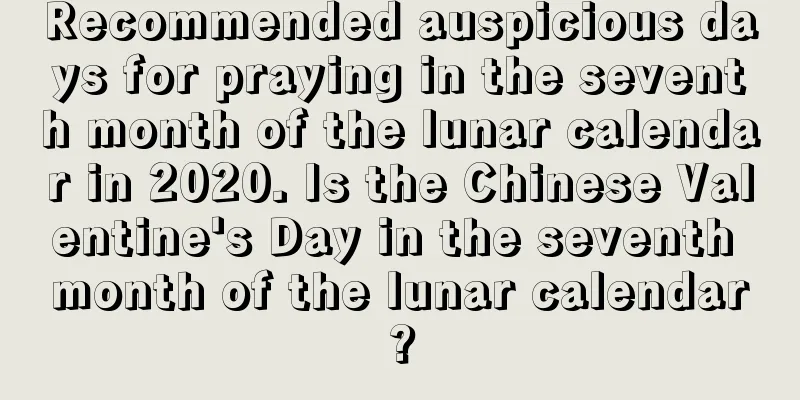What does it mean when the dragon raises its head on February 2? What are its historical origins?

Introduction: I believe many of my friends have heard of the agricultural proverb "On the second day of the second month, the dragon raises its head", but many people may wonder what the meaning of "the dragon raises its head" is and what is its implication? Where does its historical origin come from? Now, let’s follow the editor to learn more about it. The first month of the lunar calendar is about to begin with various festivals. Let us count the important traditional festivals and customs of this month. A good year starts with spring.What does the dragon raising its head mean?Dragon Raising its Head is the name given to the solar term by ancient people. Dragon Raising its Head represents the arrival of spring, the revival of all things, and indicates that a year's farming activities are about to begin. In the north, February 2 is also called the Dragon Raising its Head Day, or the Spring Dragon Festival. In the south, the Dragon Raising its Head Festival is also called the Outing Festival.There is a saying among the Chinese people on the second day of the second month of the lunar calendar: "On the second day of the second month, the dragon raises its head." It means that spring is coming, all things revive, and hibernating dragons begin to move, foreshadowing that a year's farming activities are about to begin. In the north, February 2 is also called the Dragon Raising its Head Day, or the Spring Dragon Festival. In the south it is called the Outing Festival, and in ancient times it was called the Picking Vegetables Festival. The Chinese have had the custom of "February 2" since the Tang Dynasty. According to historical records, the origin of this sentence is related to ancient astronomy's understanding of the movement of stars and agricultural solar terms. "On the second day of the second month, the dragon raises its head" is probably the most popular saying about "on the second day of the second month". What does “Dragon Raising its Head” mean? If we trace the earliest origin of this sentence, it should be related to the ancients' understanding of the movement of stars. In ancient times, people used the twenty-eight constellations to indicate the positions of the sun, moon and stars in the sky to determine the seasons and remind farmers of the farming time. There are a lot of records about this in the Book of Rites: Monthly Ordinances. Among the twenty-eight constellations, seven of them, namely Jiao, Kang, Di, Fang, Xin, Wei and Ji, form a complete dragon-shaped constellation, among which Jiao is like the two horns of a dragon. On the night of the second day of the second lunar month, the two "horns" of the "dragon" (i.e. Spica I and Spica II) slowly rise from the eastern horizon. At this time, the entire body of the "celestial dragon" is still hidden below the horizon, so it is called "the dragon raising its head." The Origin of the Dragon Raising its Head on February 2February 2nd, the day when the dragon raises its head, falls on the second day of the second month of the lunar calendar every year. Why is this day chosen as the day when the dragon raises its head? This can be explained from the following aspects. First, my country has a typical subtropical monsoon climate. After the second day of the second month of the lunar calendar every year, many parts of the country begin to enter the rainy season. For the ancient agricultural society, the rainy season after the midwinter meant a good harvest and a prosperous life. In traditional concepts, the credit for bringing rain and a good harvest to people is often attributed to the dragon. Therefore, the dragon has a lofty status in the hearts of Chinese people. It not only represents power and majesty, but also the ruler who can call the wind and rain. Therefore, people habitually call the second day of the second lunar month the Dragon Raising its Head. This is the origin of the Dragon Raising its Head on the Second Day of the Second Lunar Month.(1) The origin of the Dragon Raising its Head on February 2A folk proverb says: "On the second day of the second month, the dragon raises its head." Around the second day of the second month in the lunar calendar is Jingzhe, one of the 24 solar terms. It is said that on this day, the hibernating dragons will be awakened by the rumbling spring thunder and will raise their heads. Therefore, the ancients called the second day of the second month of the lunar calendar the Spring Dragon Festival, also known as the Dragon Head Festival or the Green Dragon Festival. Therefore, on this day people go to the banks of rivers to worship the Dragon God. The Records of the Customs of China - Shouchun Sui Shi Ji states: "On the second day of the second month, people burn fragrant incense to offer sacrifices to the dragon god." As is known to all, the dragon has been a totem believed in by the Chinese nation since ancient times. So we proudly declare that the descendants of Yan and Huang are the descendants of the dragon. For thousands of years, people have regarded the dragon as a mysterious auspicious animal. "February 2" is the day when the dragon raises its head, so it naturally becomes an important festival among the people, and many customs are also related to the dragon. In fact, the saying "On the second day of the second month, the dragon raises its head" is related to ancient astronomy. In ancient China, the Twenty-Eight Mansions were used to indicate the positions of the sun, moon and stars in the sky and to determine the seasons. Among the twenty-eight constellations, seven of them, namely Jiao, Kang, Di, Fang, Xin, Wei and Ji, form a complete dragon-shaped constellation, and Jiao is like a dragon's horn. Every February, after the spring breeze, the dragon's horn star appears on the eastern horizon at dusk, so it is called "the dragon raising its head."(2) Historical Origin of the Dragon Raising its Head on the Second Day of the Second MonthThe Spring Dragon Festival on February 2 has a long history. There is a folk legend about offering sacrifices to the Dragon God on the second day of the second month. A long time ago, there was a severe drought in Guanzhong, Shaanxi, and there was no rain for years. There is a small mountain village on the Ma'eyuan plateau east of Mount Li in Lintong. In the village there is a young man named Shuisheng. Seeing that it was a drought, he tried to find water everywhere. One day, he was in Yuantou Village, a hundred miles away, and heard an old man say: "The Jade Emperor has known about the drought in Guanzhong for a long time. He once ordered the grandson of the Dragon King of the East China Sea to go and sow rain. But when the little dragon arrived in Guanzhong, he jumped into the Long River and forgot about the important matter of sowing rain." Shuisheng asked: "How to subdue it?" The old man said: "You must get a piece of dragon-subduing wood." After going through untold hardships, Shuisheng finally found the dragon-subduing wood and subdued the little dragon. I saw the little dragon raise its head and fly into the sky. Suddenly, dark clouds rolled in, thunder roared, and heavy rain began to fall. In order to commemorate this day when the dragon raises its head, people designated the second day of the second lunar month as the "Spring Dragon Festival", leaving behind many customs.In "Wan Shu Miscellaneous Notes" by Ming Dynasty scholar Chen Bang, it says: "In February, dragons are attracted and all insects are fumigated. ... Villagers use ash to spread from outside the door into the kitchen, swirling around the water vat, which is called attracting the dragon back. Use flour to make pancakes. Fumigate the bed to prevent all insects from breeding." "Ming Palace History" records: "On the second day... each family uses millet flour and date cakes, fried in oil, or mixed with flour and spread into pancakes, which is called fumigating insects." Fu Cha Guo Chong of the Qing Dynasty also said in "Yanjing Sui Shi Ji": "The second day of February... people now call it the Dragon Head Raising Day. Those who eat cakes on this day call them dragon scales, and those who eat noodles call them dragon whiskers. Girls in the inner chambers stop sewing for fear of hurting the dragon's eyes." One of these customs has been passed down to this day. In the mid-1980s, the custom of eating millet was still preserved in northern Henan. On the morning of February 2, every household fries millet cakes, which the people call rice cakes. There is also a folk song circulating: "On February 2, fry rice cakes, use a lower fire, cook slowly, and don't burn the old man's beard." At noon, everyone eats "Laolongbu Eggs." That is corn husk, commonly known as corn noodles. In fact, the fundamental reason why people care about "Dragon Raising its Head" and commemorate it in various forms is that it is related to agricultural production. As the folk song says: "On the second day of the second month, the dragon raises its head, the big granaries are full, and the small granaries are overflowing." This is because February is the season for sowing crops. In the era when science was not well developed, people expressed their strong desire to pray for the dragon's blessing, good weather, and good harvests through various commemorative activities. Summary: Through the above article, we know the meaning of the dragon raising its head, its significance and historical origins. I hope you will like the above content. I wish you all great wealth and success in the new year! After reading this article, there are more exciting contents in the special topic of the first month of the lunar calendar. Let’s take a look! |
<<: What day is the 18th day of the first lunar month in 2017? Western Valentine's Day?
>>: When is Valentine's Day in 2017? The eighteenth day of the first lunar month?
Recommend
What is the date of June 30th of the lunar calendar in 2022? Is it an auspicious day for traveling?
The sixth month of the lunar calendar is the best ...
Can’t have sex during the Spring Equinox? Which days are absolutely forbidden to have sex?
There are certain rules and regulations for choosi...
What is the White Dew solar term? What is the origin of the solar term White Dew?
Introduction: The 24 solar terms are one of the ti...
Is it auspicious to move house on the second day of the fourth lunar month in 2020? What are the Feng Shui preferences?
Moving house is a big event, and the choice of da...
What are the do's and don'ts on May 24th of the lunar calendar in 2017?
The fifth month of the lunar calendar is the Drag...
When is White Dew in 2021? What can’t Bai Lu do? What is taboo about Bailu?
The wild geese come, the black birds return, and t...
Can I burn incense and pray on May 25th of the lunar calendar in 2018?
Praying is when people have good wishes for the pe...
What is the zodiac sign of the baby born on Arbor Day 2019?
The zodiac sign is determined by the time of birth...
Is it okay to get married and get a marriage certificate on November 29th of the lunar calendar in 2020? Is it an auspicious day?
The weather in mid-winter is solemn and the grass...
Is June 11th of the lunar calendar 2021 a good day? How about getting married on that day?
There are certain considerations and rules when ch...
Where is the God of Wealth at different times on the seventh day of the seventh lunar month in 2019
The God of Wealth, commonly known as the God of W...
Introduction to the precautions for the Beginning of Summer in 2021. What should we pay attention to during the Beginning of Summer?
The Beginning of Summer is one of the 24 solar ter...
What to do on the second day of the Chinese New Year? What are the customs and taboos on the second day of the Lunar New Year?
Introduction: The second day of the Chinese New Ye...
Is it a good idea to hold a Minor Heat sacrifice ceremony on July 7, 2019? Will it rain during the Minor Heat in 2019?
Introduction: In the traditional culture of our co...
What is the origin of Children's Day? What day is Children's Day in 2020?
Children's Day is a holiday established for ch...









